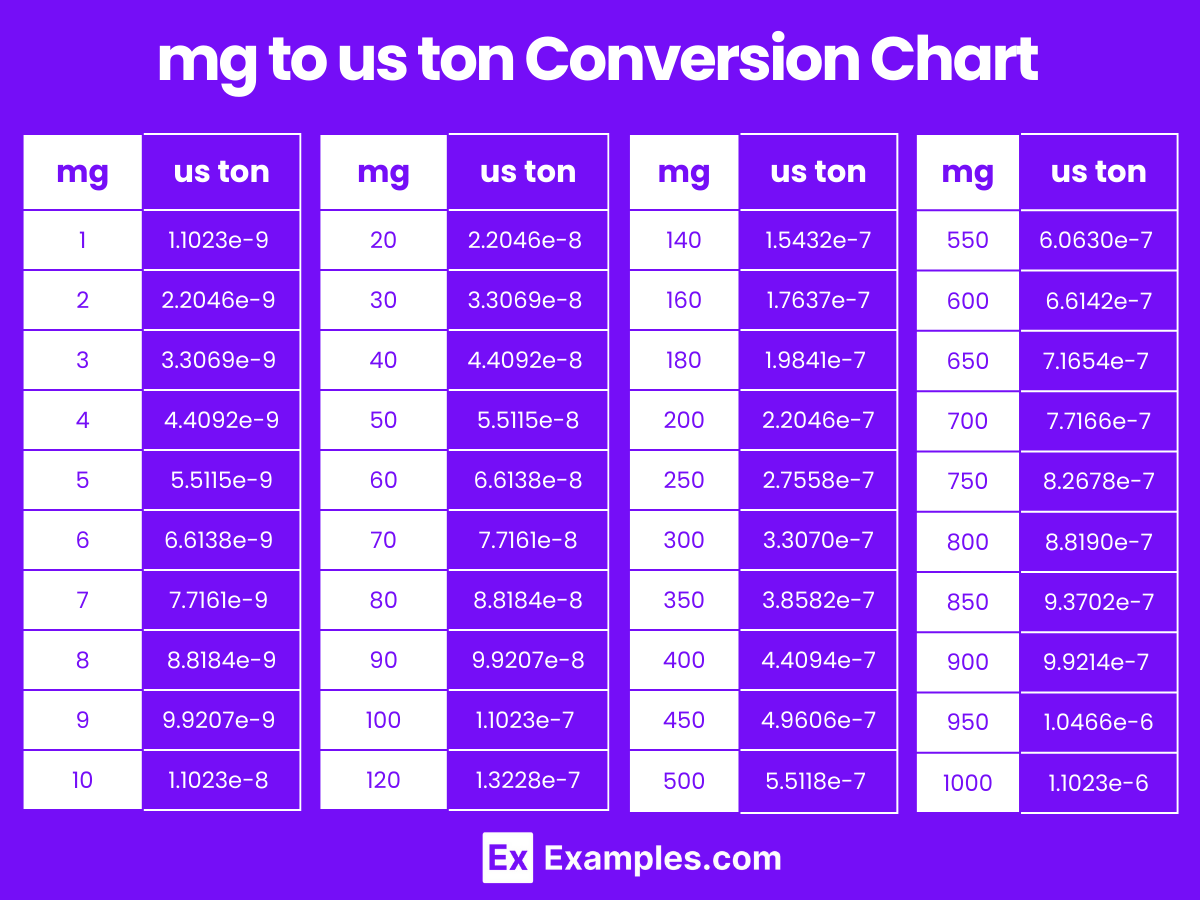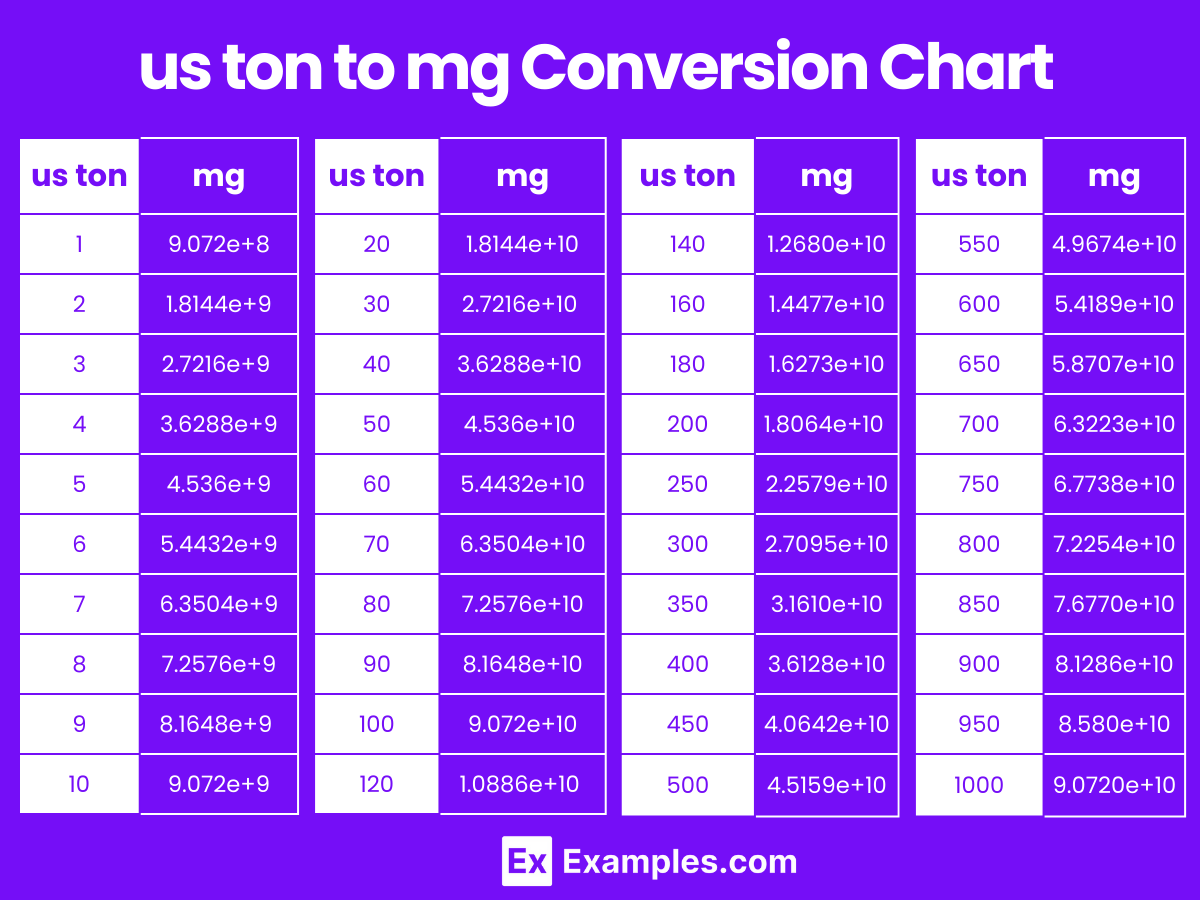Easily convert milligrams to US tons and vice versa at Examples.com. Get precise and swift results with our conversion tool.
Milligram to USTon
Formula: Mass in USTon (tn) = Mass in Milligram (mg) × 1.102×10-9
| Milligram | USTon |
|---|---|
| 1 | 1.1023e-9 |
USTon to Milligram
Formula: Mass in Milligram (mg) = Mass in USTon (tn) × 9.0719×108
| USTon | Milligram |
|---|---|
| 1 | 9.07185e8 |
Mass Converters to Milligram (mg)
| Tonne to Milligram | Kilogram to Milligram | Gram to Milligram |
| Microgram to Milligram | Imperial ton to Milligram | US ton to Milligram |
| Stone to Milligram | Pound to Milligram | Ounce to Milligram |
Mass Converters to US ton (tn)
| Tonne to US ton | Kilogram to US ton | Gram to US ton |
| Milligram to US ton | Microgram to US ton | Imperial ton to US ton |
| Stone to US ton | Pound to US ton | Ounce to US ton |
Conversion Factors:
- Milligrams to US Tons: 1 milligram = 1.1023e-9 US tons
- US Tons to Milligrams: 1 US ton = 9.072e+8 milligrams
How to Convert Milligrams to US Tons:
To convert milligrams to US tons, multiply the number of milligrams by 1.1023e-9.
US Tons=Milligrams×1.1023e−9
Example: Convert 5,000,000 milligrams to US tons.
US Tons=5,000,000×1.1023e−9=0.0055115
How to Convert US Tons to Milligrams:
To convert US tons to milligrams, multiply the number of US tons by 9.072e+8.
Milligrams=US Tons×9.072e+8
Example: Convert 4 US tons to milligrams.
Milligrams=4×9.072e+8=3,628,800,000 milligrams
Milligrams to US Tons Conversion Table
| Milligrams | US Tons |
|---|---|
| 1 mg | 1.1023e-9 US tons |
| 2 mg | 2.2046e-9 US tons |
| 3 mg | 3.3069e-9 US tons |
| 4 mg | 4.4092e-9 US tons |
| 5 mg | 5.5115e-9 US tons |
| 6 mg | 6.6138e-9 US tons |
| 7 mg | 7.7161e-9 US tons |
| 8 mg | 8.8184e-9 US tons |
| 9 mg | 9.9207e-9 US tons |
| 10 mg | 1.1023e-8 US tons |
| 20 mg | 2.2046e-8 US tons |
| 30 mg | 3.3069e-8 US tons |
| 40 mg | 4.4092e-8 US tons |
| 50 mg | 5.5115e-8 US tons |
| 60 mg | 6.6138e-8 US tons |
| 70 mg | 7.7161e-8 US tons |
| 80 mg | 8.8184e-8 US tons |
| 90 mg | 9.9207e-8 US tons |
| 100 mg | 1.1023e-7 US tons |
mg to us ton Conversion Chart

US Tons to Milligrams Conversion Table
| US Tons | Milligrams |
|---|---|
| 1 US ton | 9.072e+8 mg |
| 2 US tons | 1.8144e+9 mg |
| 3 US tons | 2.7216e+9 mg |
| 4 US tons | 3.6288e+9 mg |
| 5 US tons | 4.536e+9 mg |
| 6 US tons | 5.4432e+9 mg |
| 7 US tons | 6.3504e+9 mg |
| 8 US tons | 7.2576e+9 mg |
| 9 US tons | 8.1648e+9 mg |
| 10 US tons | 9.072e+9 mg |
| 20 US tons | 1.8144e+10 mg |
| 30 US tons | 2.7216e+10 mg |
| 40 US tons | 3.6288e+10 mg |
| 50 US tons | 4.536e+10 mg |
| 60 US tons | 5.4432e+10 mg |
| 70 US tons | 6.3504e+10 mg |
| 80 US tons | 7.2576e+10 mg |
| 90 US tons | 8.1648e+10 mg |
| 100 US tons | 9.072e+10 mg |
us ton to mg Conversion Chart

Differences Between Milligrams to US Tons
| Aspect | Milligrams | US Tons |
|---|---|---|
| Definition | A milligram is a unit of mass equal to one thousandth of a gram. | A US ton is a unit of mass equal to 2,000 pounds. |
| Metric vs. Imperial | Milligrams are part of the metric system. | US tons are part of the imperial system. |
| Size | Milligrams are much smaller in scale. | US tons are much larger in scale. |
| Conversion Factor | 1 milligram = 1e-6 kilograms. | 1 US ton = 907,184.74 milligrams. |
| Usage | Milligrams are commonly used for small quantities in medicine and science. | US tons are used for measuring larger quantities, such as in shipping and industrial contexts. |
| Precision | Milligrams provide a high level of precision for small measurements. | US tons provide a broader measurement suited for large quantities. |
| Symbol | Milligrams are denoted as “mg.” | US tons are denoted as “US tons” or “ton.” |
| Conversion Example | 1,000,000 milligrams = 1 kilogram. | 1 US ton = 907,184,740 milligrams. |
1. Solved Examples on Converting Milligrams to US Tons
Example 1
Problem: Convert 1,000,000 milligrams to US tons.
Solution: 1,000,000 mg × 1.1023e-9 = 0.0011023 tons
Example 2
Problem: Convert 500,000 milligrams to US tons.
Solution: 500,000 mg × 1.1023e-9 = 0.00055115 tons
Example 3
Problem: Convert 250,000 milligrams to US tons.
Solution: 250,000 mg × 1.1023e-9 = 0.000275575 tons
Example 4
Problem: Convert 10,000,000 milligrams to US tons.
Solution: 10,000,000 mg × 1.1023e-9 = 0.011023 tons
Example 5
Problem: Convert 75,000 milligrams to US tons.
Solution: 75,000 mg × 1.1023e-9 = 0.0000826725 tons
2. Solved Examples on Converting US Tons to Milligrams
Example 1
Problem: Convert 0.001 US tons to milligrams.
Solution: 0.001 tons × 9.072e+8 mg/ton = 907,200 mg
Example 2
Problem: Convert 0.5 US tons to milligrams.
Solution: 0.5 tons × 9.072e+8 mg/ton = 453,600,000 mg
Example 3
Problem: Convert 2 US tons to milligrams.
Solution: 2 tons × 9.072e+8 mg/ton = 1,814,400,000 mg
Example 4
Problem: Convert 0.05 US tons to milligrams.
Solution: 0.05 tons × 9.072e+8 mg/ton = 45,360,000 mg
Example 5
Problem: Convert 10 US tons to milligrams.
Solution: 10 tons × 9.072e+8 mg/ton = 9,072,000,000 mg
What are some common uses for converting milligrams to US tons?
Converting milligrams to US tons is often used in industries dealing with large-scale quantities of materials, such as manufacturing, mining, and logistics, to ensure accurate measurement and reporting.
Can I use an online calculator for converting milligrams to US tons?
Yes, online calculators can simplify the conversion process. Just enter the amount in milligrams and select the conversion option to US tons to get the result quickly.
What are some practical applications of converting milligrams to US tons?
Practical applications include calculating the weight of bulk materials, measuring large quantities in industrial processes, and converting product specifications in logistics and manufacturing.
Is it possible to convert fractions of milligrams to US tons?
Yes, fractions of milligrams can be converted to US tons using the same conversion factor. Ensure you handle decimal places accurately to maintain precision in the result.
What tools can help with converting milligrams to US tons?
Tools such as online conversion calculators, scientific calculators, and spreadsheet software can assist with conversions. Many of these tools can handle large numbers and scientific notation efficiently.
How do I handle very large or very small numbers in conversions?
For very large or very small numbers, use scientific notation or a calculator that supports such formats. This approach ensures precision and avoids errors in manual calculations.

